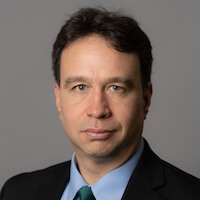The Biggest Higher Ed Story of the Decade: How Online Degrees at Scale Will Transform Education
If you look at the long-term trajectory of where higher education’s going, I think every school is going to be looking at, ‘How can we lower cost?’ Online degrees at scale can support this.
Joshua Kim, Director of Online Programs and Strategy at Dartmouth College and Senior Fellow for Academic Transformation, Learning, and Design at Georgetown University
Educational costs in the United States are soaring. And with the shift of many brick-and-mortar institutions’ programs to online education in the wake of Covid-19, students are arguing the cost for education at these schools should be adjusted as well.
Over the past forty years, education tuition in the United States skyrocketed 260 percent. In 2019, the average cost of attending a four-year public college was over $100,000; to attend a private college cost over $200,000. And now, many positions in the workforce require candidates to have a master’s degree. This trend is reflected in the 73 percent increase in master’s degrees conferred in the United States between 2001 and 2018, according to the U.S. Bureau of Labor Statistics. Master’s degrees in business, education, and healthcare dominated those conferred, and workers with master’s degrees earned a premium over those in similar roles who did not.
Education expert Joshua Kim contends that even after the pandemic has resolved, there will be calls for reduced-cost education offerings online. Furthermore, he believes that offering online degrees at scale will be a major part of the solution for students are educators alike.
We spoke with professors that are also experts in the design and rollout of scaled online degrees to learn more about the development of online degrees at scale and what they could mean for students.
Meet the Experts: Joshua Kim and Ray Schroeder

Joshua Kim, Director of Online Programs and Strategy at Dartmouth College and Senior Fellow for Academic Transformation, Learning, and Design at Georgetown University.
Joshua Kim is the director of online programs and strategy at Dartmouth College’s Center for the Advancement of Learning (DCAL) and a senior fellow for Academic Transformation, Learning, and Design at the Center for New Designs in Learning & Scholarship (CNDLS) at Georgetown University.
Kim has a PhD in sociology and demography from Brown University. Over his career, he helped start Britannica.com’s education division in San Francisco and was one of the original founders of Connecticut-based Quinnipiac University Online. Kim recently released two books through Johns Hopkins University Press titled Learning Innovation and the Future of Higher Education and The Low-Density University: 15 Scenarios for Higher Education—both co-authored with Georgetown University professor Eddie Maloney.

Ray Schroeder, Senior Fellow at the University Professional and Continuing Education Association and Professor Emeritus and Associate Vice Chancellor at the University of Illinois Springfield
Ray Schroeder is a senior fellow of the University Professional and Continuing Education Association (UPCEA), as well as a professor emeritus and associate vice chancellor at the University of Illinois Springfield (UIS). He launched the UIS online learning program in 1997; founded the university’s Center for Online Learning Research and Service; and became associate vice chancellor for online learning in 2013—a position he still holds.
Schroeder regularly publishes articles and book chapters and presents nationally on emerging topics in online and technology-enhanced learning. He is the recipient of numerous national awards and citations for individual excellence and leadership from various associations and entities, including the Sloan Consortium, the U.S. Distance Learning Association, the American Journal of Distance Education, the Illinois Council for Continuing Higher Education, the University of Wisconsin, and the University of Illinois.
Q&A with Professor Kim and Professor Schroeder
Online Education.com: First, what are online degrees at scale?
Professor Kim: This is a new kind of concept, so I’d say we’re all trying to figure this out and people may have different definitions depending on with whom you speak. The way I think about online degrees at scale is really about cost and access. We know that for most people, once they finish their undergraduate degree, they’re likely going to have to go get a master’s degree either at the beginning of their career, in the middle, if they’re going to make a career transition, or at some other point.
When I’m thinking about online degrees at scale, I’m largely first thinking about master’s degrees as it’s really been the fastest-growing segment of higher education now for for the last 20 years or so with lots of schools coming out with master’s degrees. However, master’s degrees can get very expensive.
Online degrees at scale can help students acquire the credentials they need but at a lower cost.
When I think about this, I think about my younger daughter a lot because she’s going to be a junior in college and she’s studying to be a primary school teacher. Eventually, she’ll have to get her master’s degree in education since school systems want master-credentialed teachers. And she would either need one to get her first job or move up in her work.
But it would be pretty challenging for her to do a traditional master’s and take on the debt of the master’s program with a teacher’s salary. That’s just really hard. And there are lots of professions with similar challenges, like social work, speech therapy, business, journalism, and so on.
Master’s degrees at scale can drive the cost for education down, while also keeping the three essential things she’ll need in the master’s degrees, which I like to call the “three C’s:”
- Credential – You need the master’s credential;
- Coaching – Coaching or mentoring from educators through the program to help learn the material and really become an expert; and
- Competency – To be able to show expert competency in the field acquired from the master’s-level credential.
So, I’m very hopeful that a degree at scale, which is much lower cost, can provide her with those big things that she needs without having her to go into lots of debt.
Online Education.com: What do you imagine online degrees at scale will look like in the immediate and long-term future?
Professor Schroeder: Certainly, at-scale master’s degrees will continue to proliferate. I expect them to ultimately become the leading mode of degree programs for working professionals. Models will build on the success of early programs, such as the many Coursera, edX, and other massive open online course (MOOC) provider programs. Public and private institutions will compete on the same playing field for students in these at-scale programs.
The programs will be differentiated by the ways in which they modify the curriculum to meet the needs of a specific industry. For example, one MBA program might be designed with entrepreneurs launching start-ups in mind; another may be focused on the needs of financial institutions; and still others on the tech industry.
The large MOOC providers will have an advantage in designing and launching new at-scale programs. More than ever before, industry will step up to articulate their needs and to develop partnerships with colleges and universities to provide programs that meet today’s and tomorrow’s needs.
One might expect to see, for example, a master’s degree branded with the name of a large multinational corporation; imagine for example a Microsoft master’s in quantum computing at XYZ university. This kind of industry-education partnership is likely to thrive as we enter the fourth industrial revolution.
Online Education.com: Do you see any groups gaining traction in shaping the discussion and development of scaled, online degrees?
Professor Kim: Where I think this is quite interesting is that we’re seeing that degrees at scale are starting to occur with partnerships between universities and either non-profit or for-profit organizations.
The two organizations that I know best who are heavily invested in this are edX, which is a non-profit consortium started by Harvard and MIT, and Coursera, which was spun out by a couple of professors at Stanford and is a for-profit company that is working with schools.
At Dartmouth, we’re working with both of these platforms. Although we’re not necessarily looking at low-cost degrees at scale yet if you look at the long-term trajectory of where higher education’s going, I think every school is going to be looking at, “How can we lower cost?” Online degrees at scale can support this.
And these platforms are booming. Coursera now has 60 million learners on this platform, which is an amazing number. And they’ve grown enormously during Covid-19, which makes it much easier to bring the technology because they bring this critical mass of learners that allows schools to go out with degrees and other non-credit programs to reach all those learners.
There’s one thing we know and one thing we don’t know for students; we know from some examples that online degrees at scale can very much lower cost. Boston University has an MBA program that costs $25,000; Illinois has an iMBA at $22,000; and Georgia Tech is very well-known for its low-cost master’s degrees in computer science. We’re seeing more of these roll out. And we know that there’s strong demand and that the costs are much lower.
What I think we have to figure out is how do you take a degree that costs $60,000 or $80,000 and instead make it $25,000 or $30,000?
It’s kind of a difficult challenge, and the only way to do that if you go to scale is to educate many more learners so that you can bring in enough revenue to cover the cost of the master’s degree.
So then the question becomes how do we ensure these low-cost scale degrees are high-quality when you’re bringing many many more students through a larger program?
There are a couple of ways for how we can really bring these costs down so students don’t have a ton of debt.
The first thing, for example, is that for my daughter to get her master’s in education, she does not need to be taught by world-famous professors or the professors who are writing the books about teaching and education. She can read their stuff but she doesn’t need to be taught by them. She needs to be taught by people whose job it is and who know how to coach, mentor, and facilitate learning. And that could be a wider range of educators, who frankly are not as expensive as some research-productive faculty.
We will also likely have more technologies like artificial intelligence and big data that will enable educators in these programs to better target interventions to learners at just the right time when they need extra assistance. But it’s not big data alone that will be critical to degrees at scale. The educator is still the key component of that. It’s just that this technology should help out.
We know that it’ll be different from degrees that you get if you go to campus or do a traditional online course where you have close contacts and relationships with the faculty at schools. We know that would be different, so we can’t say these programs will be the same. But we think that they can be of very high quality. It would just be a different kind of learning experience.
That’s what we all have to figure out now. I think it’s exciting for higher education because we don’t want students to have a lot of debt. It doesn’t benefit us to have the cost be really high. We want to roll out our programs and educate learners.
Online Education.com: Ultimately, what could online degrees at scale mean for students?
Professor Schroeder: We are entering the era of the “60-year-learner” in which students repeatedly return to universities to add to their knowledge and credentials as they advance through their careers. The US Department of Labor reports that the average tenure of an employee with an employer in America is just over four years. That is, employees are moving forward in their careers by changing not just jobs but employers as well on an average of every four years.
The changes require continuing education to qualify and excel at the next position. I anticipate scaffolded degrees. That is professional degrees that build upon a series of professional certificates.
A master’s degree in computer networking and science might begin with a four-course sequence leading to a certificate in blockchain development. It might continue with a three-course sequence in neural networking. And, it might conclude with three courses and a master’s project focused on quantum computing.
Such a scaffolded approach grows with the student’s career. It gives useful certifications along the way that can be used in professional advancement.
